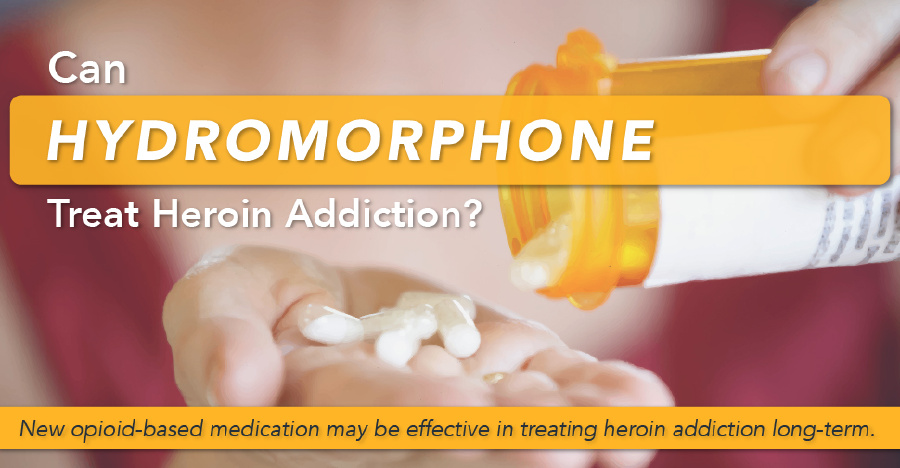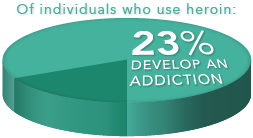
Since the introduction of opioid-based medication therapies, those struggling with heroin addiction can find relief while undergoing detox and recovery. The most common medications to date include Methadone, Suboxone, Naltrexone, and Desipramine. A new study has shown that Hydromorphone, an opioid-based medication, can be effective in treating heroin addiction long-term.
This new research is known as the Study to Assess Longer-Term Opioid Medication Effectiveness (SALOME), and was published in JAMA Psychiatry. This research has concluded that hydromorphone was as effective as prescription heroin (diacetylmorphine) for individuals who could not find relief from other treatments.
The Opiate Epidemic
 In the United States, an opioid epidemic has been recognized by the Center for Disease Control (CDC). The number of overdose death from opioid use has nearly quadrupled since 1999. This is due in part to the significant increase in opiate medication prescriptions and has prompted more strict regulations on prescribing physicians. According to the American Society of Addiction Medicine (ASAM):
In the United States, an opioid epidemic has been recognized by the Center for Disease Control (CDC). The number of overdose death from opioid use has nearly quadrupled since 1999. This is due in part to the significant increase in opiate medication prescriptions and has prompted more strict regulations on prescribing physicians. According to the American Society of Addiction Medicine (ASAM):
- 1.9 million Americans have had a substance abuse disorder involving prescription pain relievers in 2014.
- 586,000 had a substance abuse disorder involving heroin.
- An estimated 23% of individuals who use heroin develop addiction.
- Drug overdose is the leading cause of accidental death in the US with over 47,055 overdoses in 2014. Heroin is responsible for 18,893 of those deaths or nearly half.
- In 2008, the prescriptions for opioid pain relievers had quadrupled since 1999, as have the number of lethal overdose cases.
- The number of admissions for substance abuse disorders were over six times greater in 2008 than in 1999.
- In 2012, 259 million prescriptions were written for opioids.
- In 2014, 94% of surveyed heroin users claimed to become dependent on prescription opioids first and turned to heroin because the drug was less expensive and easier to obtain.
- Opioid-related deaths have increased by 6% per year from 2000 to 2010 and increased an average of 37% per year from 2010 to 2013.
The opioid epidemic has caused a significant increase in the abuse of heroin. In turn, researchers have worked diligently to help fix what has already become a national problem. With the introduction of Hydromorphone as an opioid addiction treatment, it’s another step toward a better recovery system.
What Are The Benefits Of Hydromorphone?
Hydromorphone is an opioid agonist which allows for a monitored tapering, as well as relief from the withdrawals of lessened opioid exposure. The recent studies have found benefits from the utilization of Hydromorphone. Most notably:
- Researchers in Vancouver, WA followed 202 participants who received either injectable hydromorphone or diacetylmorphine for six months.
- It was concluded that the effectiveness of hydromorphone was equivalent to that of diacetylmorphine.
- Researchers noted an 80%v retention period over six months and recorded a significant reduction of illegal activities within days.
- Hydromorphone can be administered orally, rectally, or as an injection.
 In light of the staggering rise in heroin usage in the United States, researchers have resolved to find alternative methods of relief. Opioid-based medications are found to best aid in addiction recovery. Hydromorphone is a potential answer to patients who are non-responsive to previous treatments. While these findings can help many people struggling to recover from heroin addiction, time will tell if the benefits outweigh the risk.
In light of the staggering rise in heroin usage in the United States, researchers have resolved to find alternative methods of relief. Opioid-based medications are found to best aid in addiction recovery. Hydromorphone is a potential answer to patients who are non-responsive to previous treatments. While these findings can help many people struggling to recover from heroin addiction, time will tell if the benefits outweigh the risk.
What Are The Risks Of Hydromorphone?
With every medication-based addiction treatment, there are risks and benefits. The biggest concern is the similarities between heroin and Hydromorphone. An agonist, Hydromorphone is in the same class as heroin. Even with monitoring, there is a chance that the drug could be misused. Some of the risks from the use of Hydromorphone include:
- Allergic reactions to the drug, such as rash, itching, hives, and swelling.
- Respiratory problems.
- Changes in vision, dizziness, and confusion.
- Feeling faint, seizures, and heart palpitations.
- Insomnia, drowsiness, and dry mouth.
- Flushing, headache, nausea, and vomiting.
- Interactions with other drugs and alcohol.
- Cannot be taken while pregnant or breastfeeding.
- Withdrawal symptoms if drug is discontinued.
- Hyperalgesia (sensitivity to stimuli) when dosage is increased.
- Possibility of overdose if misused, or combined with other opioids.
Could Hydromorphone Help?
While those risks are worth considering, the pros of hydromorphone highly outweigh the negatives. Studies have concluded great success with the use of Hydromorphone for those struggling with heroin addiction.
In some cases, multiple relapse is due to non-effective means of treatment. It is clear that Hydromorphone would not be recommended for people who are able to stop with more commonly used medications, such as antagonists and partial agonists. If you’re experiencing severe trouble with recovering from heroin addiction, you may benefit from Hydromorphone in the future.
Learn More Today
 If you or a loved one is struggling with heroin addiction, there are many medication-aided treatments from which to choose. Going over options and becoming well-informed is important to making a good decision. And don’t forget that the caring staff at DrugRehab.org is here to help you in your journey.
If you or a loved one is struggling with heroin addiction, there are many medication-aided treatments from which to choose. Going over options and becoming well-informed is important to making a good decision. And don’t forget that the caring staff at DrugRehab.org is here to help you in your journey.
